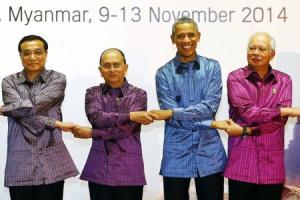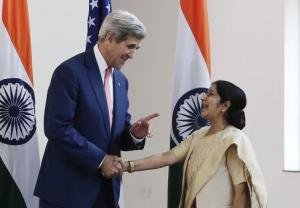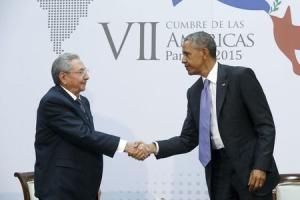By Jason Szep and Matt Spetalnick
WASHINGTON (Reuters) - In the weeks leading up to a critical annual U.S. report on human trafficking that publicly shames the world’s worst offenders, human rights experts at the State Department concluded that trafficking conditions hadn’t improved in Malaysia and Cuba. And in China, they found, things had grown worse.
The State Department’s senior political staff saw it differently — and they prevailed.
A Reuters examination, based on interviews with more than a dozen sources in Washington and foreign capitals, shows that the government office set up to independently grade global efforts to fight human trafficking was repeatedly overruled by senior American diplomats and pressured into inflating assessments of 14 strategically important countries in this year’s Trafficking in Persons report.
In all, analysts in the Office to Monitor and Combat Trafficking in Persons - or J/TIP, as it’s known within the U.S. government — disagreed with U.S. diplomatic bureaus on ratings for 17 countries, the sources said.
The analysts, who are specialists in assessing efforts to combat modern slavery - such as the illegal trade in humans for forced labor or prostitution - won only three of those disputes, the worst ratio in the 15-year history of the unit, according to the sources.
As a result, not only Malaysia, Cuba and China, but countries such as India, Uzbekistan and Mexico, wound up with better grades than the State Department’s human-rights experts wanted to give them, the sources said. (Graphic looking at some of the key decisions here: http://reut.rs/1gF2Wz5)
Of the three disputes J/TIP won, the most prominent was Thailand, which has faced scrutiny over forced labor at sea and the trafficking of Rohingya Muslims through its southern jungles. Diplomats had sought to upgrade it to so-called “Tier 2 Watch List” status. It remains on “Tier 3” - the rating for countries with the worst human-trafficking records.
The number of rejected recommendations suggests a degree of intervention not previously known by diplomats in a report that can lead to sanctions and is the basis for many countries’ anti-trafficking policies. This year, local embassies and other constituencies within the department were able to block some of the toughest grades.
State Department officials say the ratings are not politicized. “As is always the case, final decisions are reached only after rigorous analysis and discussion between the TIP office, relevant regional bureaus and senior State Department leaders,” State Department spokesman John Kirby said in response to queries by Reuters.
Still, by the time the report was released on July 27, Malaysia and Cuba were both removed from the "Tier 3" blacklist, even though the State Department’s own trafficking experts believed neither had made notable improvements, according to the sources.
The Malaysian upgrade, which was highly criticized by human rights groups, could smooth the way for an ambitious proposed U.S.-led free-trade deal with the Southeast Asian nation and 11 other countries.
View gallery

(L-R) China's Premier Li Keqiang, Myanmar's President Thein Sein, U.S. President Barack Obam …
Ending Communist-ruled Cuba’s 12 years on the report’s blacklist came as the two nations reopened embassies on each other’s soil following their historic détente over the past eight months.
And for China, the experts’ recommendation to downgrade it to the worst ranking, Tier 3, was overruled despite the report’s conclusion that Beijing did not undertake increased anti-trafficking efforts.
That would have put China alongside the likes of Syria and North Korea, regarded by the United Nations as among the world’s worst human right abusers.
Typically, J/TIP wins more than half of what officials call “disputes” with diplomatic sections of the State Department, according to people familiar with the process.
“Certainly we have never seen that kind of an outcome,” said one U.S. official with direct knowledge of the department.
ABILITY TO EMBARRASS
The Trafficking in Persons report, which evaluated 188 countries and territories this year, calls itself the world’s most comprehensive resource of governmental anti-human trafficking efforts. Rights groups mostly agree.
It organizes countries into tiers based on trafficking records: Tier 1 for nations that meet minimum U.S. standards; Tier 2 for those making significant efforts to meet those standards; Tier 2 "Watch List" for those that deserve special scrutiny; and Tier 3 for countries that fail to comply with the minimum U.S. standards and are not making significant efforts.
While a Tier 3 ranking can trigger sanctions limiting access to aid from the United States, the International Monetary Fund or the World Bank, such action is frequently waived.
The real power is its ability to embarrass countries into action. Many countries aggressively lobby U.S. embassies to try to avoid sliding into the Tier 3 category. Four straight years on the Tier 2 Watch List triggers an automatic downgrade to Tier 3 unless a country earns a waiver or an upgrade.
The leverage has brought some success, including pressuring Switzerland to close loopholes that allowed the prostitution of minors and prompting the Dominican Republic to convict more child trafficking offenders.
View gallery

U.S. Secretary of State John Kerry (L) shakes hands with India's External Affairs Minister Sushm …
President Barack Obama has called the fight against human trafficking “one of the great human rights causes of our time” and has pledged the United States “will continue to lead it.”
But the office set up in 2001 by a congressional mandate to spearhead that effort is increasingly struggling to publish independent assessments of the most diplomatically important countries, the sources said.
The rejection of so many recommendations could strengthen calls by some lawmakers to investigate how the report is compiled. After Reuters on July 8 reported on the plans to upgrade Malaysia, 160 members of the U.S. House and 18 U.S. senators wrote to Secretary of State John Kerry urging him to keep Malaysia in Tier 3, based on its trafficking record. They questioned whether the upgrade was politically motivated.
Senator Robert Menendez, a Democrat, has threatened to call for a Senate hearing and an inspector general to investigate if top State Department officials removed Malaysia from the lowest tier for political reasons.
The final decision on disputed rankings this year was made in meetings attended by some of the State Department’s most powerful diplomats, including Deputy Secretary of State Tony Blinken, Under Secretary of State for Political Affairs Wendy Sherman and Kerry’s Chief of Staff, Jonathan Finer, according to the sources.
Sarah Sewall, who oversees J/TIP as Undersecretary of State for Civilian Security, Democracy and Human Rights, presented the experts’ recommendations, the sources said. The State Department declined to make any of those officials available for comment.
“NO, NO, NO”
The unprecedented degree of discord over this trafficking report began to become clear after Reuters early last month revealed plans to upgrade Malaysia from the lowest Tier 3 rank to Tier 2 Watch List.
The improved ranking came in a year in which Malaysian authorities discovered dozens of suspected mass migrant graves and human rights groups reported continued forced labor in the nation’s lucrative palm oil, construction and electronics industries. As recently as April, the U.S. ambassador to Malaysia, Joseph Yun, urged the country to take prosecution of human trafficking violations more seriously.
U.S. officials have denied that political considerations influenced Malaysia’s rankings.
“No, no, no,” said Sewall, when asked by reporters last Monday whether Malaysia was upgraded to facilitate trade negotiations. She said the decision was based on how Malaysia was dealing with trafficking.
View gallery

U.S. President Barack Obama (R) shakes hands with Cuba's President Raul Castro as they hold a bi …
Representative Chris Smith, a New Jersey Republican who authored a 2000 law that led to the creation of J/TIP, said in an interview that the office’s authority is being undermined by the president’s agenda. “It’s so politicized,” he said.
If Malaysia had remained on Tier 3, it would have posed a potential barrier to Obama's proposed trade pact, the Trans-Pacific Partnership. That deal is a crucial part of his pivot to Asia policy. Congress approved legislation in June giving Obama expanded trade negotiating powers but prohibiting deals with Tier 3 countries such as, at that time, Malaysia.
Congressional sources and current and former State Department officials said experts in the J/TIP office had recommended keeping Malaysia on Tier 3, highlighting a drop in human-trafficking convictions in the country to three last year from nine in 2013. They said, according to the sources, that some of Malaysia’s efforts to end forced labor amounted to promises rather than action.
The analysts also clashed over Cuba’s record with the State Department’s Western Hemisphere Affairs Bureau, whose view took precedence in the final report.
Human rights groups and people with knowledge of the negotiations over the rankings said an unearned upgrade for Cuba, especially at a time of intense attention due to the historic diplomatic thaw between Washington and Havana, could undermine the integrity of the report.
Cuba had been on the “border line” for an upgrade in recent years, a former State Department official said. And although Cuba ended up with an upgrade, the final report remained highly critical, citing concerns about Cuba’s failure to deal with a degree of alleged forced labor in medical missions that Havana sends to developing countries.
China was another source of friction. J/TIP’s analysts called for downgrading China, the world’s second-biggest economy, to Tier 3, criticizing Beijing for failing to follow through on a promise to abolish its “re-education through labor” system and to adequately protect trafficking victims from neighboring countries such as North Korea. The final report put China on Tier 2 Watch List.
SHOWING DEFERENCE
But the candor of J/TIP can run afoul of other important diplomatic priorities, particularly in countries beset by instability or corruption where U.S. diplomats are trying to build relationships. That leads every year to sometimes contentious back-and-forth over the rankings with far-flung embassies and regional bureaus – the diplomatic centers of gravity at the State Department.
“There is supposed to be some deference to the expertise of the office,” said Mark Lagon, J/TIP’s ambassador-at-large from 2007 to 2009 and now president of Freedom House, an advocacy group in Washington. If the office is now losing more disputes over rankings than it is winning, that would be “an unfortunate thing,” he said.
Most U.S. diplomats are reluctant to openly strike back at critics inside and outside of the administration who accuse them of letting politics trump human rights, the sources said.
But privately, some diplomats say that J/TIP staffers should avoid acting like “purists” and keep sight of broader U.S. interests, including maintaining open channels with authoritarian governments to push for reform and forging trade deals that could lift people out of poverty.
From the start, J/TIP has tried to be impartial. It is based in a building a few blocks away from State Department, adding to the sense of two separate identities and cultures.
But establishing genuine independence has been difficult. At first, the heads of regional bureaus, representing the business and political interests of U.S. embassies, would join the J/TIP team around a table and have almost an equal say in deciding country rankings in the final report.
John Miller, a former Republican congressman from Washington state named by President George W. Bush to head the bureau from 2002 to 2006, overhauled that structure.
“I said ‘no way’,” Miller said in an interview. By 2004, decisions on how to rank countries were made by his office. Diplomats who objected could appeal to then deputy secretary of state Richard Armitage. “He rarely overruled me,” said Miller. Armitage, who is no longer in a government job, did not respond to a request for comment sent through his office.
Laura Lederer, who helped set the office up as senior human trafficking adviser from 2002 to 2007, said its job was “to assess and rate countries solely on their progress in addressing the prevention of trafficking, the prosecution of traffickers, and protection and assistance of victims.”
But officials who worked in the office over the past 15 years acknowledge that countries with sensitive diplomatic or trade relationships with the United States sometimes received special treatment following pressure from local embassies and other constituencies within the department.
One such country is Mexico – a key trading partner whose cooperation is also needed against drug trafficking and illegal immigration. It was kept at Tier 2 despite the anti-trafficking unit’s call for a worse grade, according to officials in Washington and Mexico City.
The controversy over this year’s report comes at a time when J/TIP lacks a congressionally confirmed leader.
The prior chief, ambassador-at-Large Luis CdeBaca, left in November of last year. His deputy, Alison Friedman, then resigned to join a non-profit anti-slavery organization. And then it took until mid-July for Obama to nominate Georgia federal prosecutor Susan Coppedge as the next ambassador-at-large.
The lack of a director can increase the unit’s exposure to political influence, said Lederer.
Some say the perceived hit to the integrity of the 2015 report could do lasting damage.
“It only takes one year of this kind of really deleterious political effect to kill its credibility,” said Mark Taylor, a former senior coordinator for reports and political affairs at J/TIP from 2003 to 2013.
(Reporting by Jason Szep and Matt Spetalnick; Additional reporting by Patricia Zengerle in Washington, Dave Graham in Mexico City, Michael Martina in Beijing, and Dan Trotta in Havana; Editing by Martin Howell)